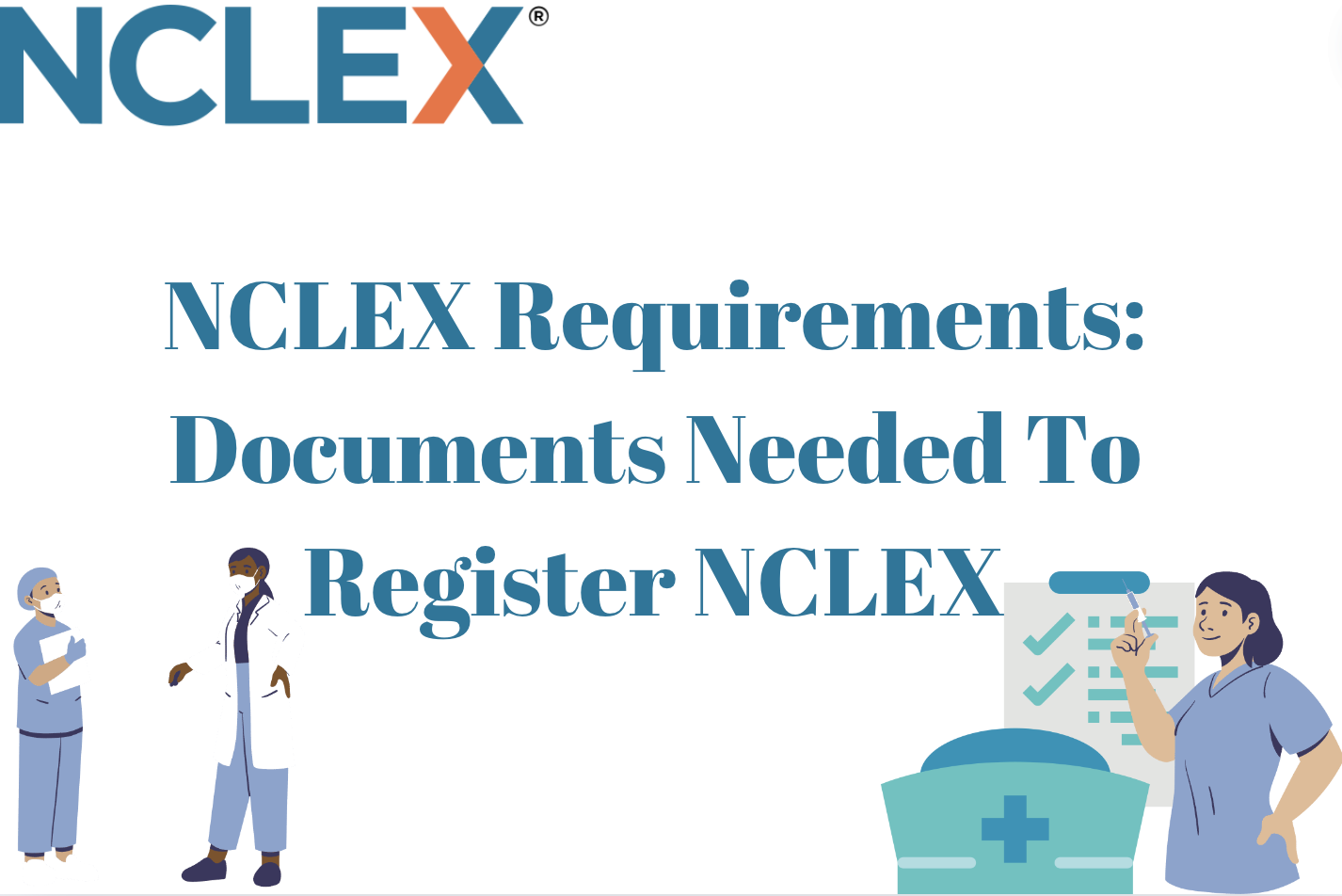The National Council Licensure Examination NCLEX has been a national exam for nurses seeking licenses in the United States, Canada, and Australia. The NCLEX is used to assess a candidate’s eligibility to become a licensed nurse in the US.
It is available in two primary versions that is The NCLEX-RN which is for applicants who want to work as registered nurses (RNs) and The NCLEX-PN which is for applicants who want to work as vocational or practical nurses (LVNs or LPNs).
The NCLEX scoring method assigns logits, a unit of measurement, to each question in order to establish a candidate’s passing or failing score. The discrepancies between the candidate’s estimated ability and the difficulty of the question are reported using logits and the NCLEX’s current passing score is -0.18 logits.
How Is The NCLEX Scored?
You can approach your study plan more successfully and get ready for the test by being aware of how the NCLEX is graded. Unlike conventional fixed-form exams, the National Council Licensure Examination (NCLEX) is graded utilizing a computerized adaptive testing (CAT) system.
Neither a raw score nor a percentage of questions answered correctly are provided by the NCLEX. Rather, it uses a pass/fail system that is determined by how well you perform in comparison to the passing standard. If your performance regularly demonstrates competency, you will pass; if not, you will fail.
The CAT algorithm adjusts to match your skill level. The next question will be a little trickier if you answer the previous one right. If you give a wrong answer, the following question will be a little simpler. This adaptable quality makes it easier to gauge your degree of competency. The National Council of State Boards of Nursing (NCSBN) sets the passing level, which is revised and assessed on a regular basis.
A minimum of 75 questions and a maximum of 145 questions make up the NCLEX-RN exam. There are a minimum of 85 questions and a maximum of 205 questions on the NCLEX-PN exam. There may be a range in the amount of questions you get.
The exam consists of both multiple-choice and alternative format questions (hot spots, drag-and-drop, and fill-in-the-blank). The NCLEX bases its final judgment on a confidence interval surrounding the ability estimate. You pass if the confidence interval shows that you are over the minimum required score. You fail if it shows that you are not up to the required standard.
Within 48 hours after completing the exam, most states allow you to receive unofficial results, also referred to as “quick results,” which indicate whether you passed or failed but do not give a full score. Official results are sent by the state board of nursing and are usually accessible in a few weeks. Along with your official status, these findings might contain other information.
What Does It Mean To Pass The NCLEX?
Getting your nursing license is contingent upon passing the NCLEX. Therefore having passed the NCLEX indicates that you are at least proficient enough to practice nursing safely and effectively.
To pass the NCLEX, there is no set score or minimum amount of questions required. Instead, the user needs to keep their basic logit score at zero or lower. The NCLEX is a computer adaptive test, so once there is a minimum of 95% confidence in your ability, it will declare that you have passed. If your score is greater than 0.00, it indicates that you correctly answered enough questions and it means you didn’t answer enough questions if your score was negative.
What Does It Mean To Fail The NCLEX?
Every state requires graduates of nursing schools to pass the NCLEX-RN in order to obtain a license to practice as a registered nurse; therefore, failing the exam will prevent you from obtaining a nursing license.
If you do not pass the National Council Licensure Examination (NCLEX), it indicates that you did not satisfy the minimal competency threshold needed to practice entry-level nursing safely and efficiently.
You will receive a comprehensive performance report from the National Council of State Boards of Nursing (NCSBN) following your failure. This report helps you find areas that require more attention in your upcoming preparation by displaying your performance in several content categories.
If necessary, think about signing up for an NCLEX refresher course or hiring a tutor with experience helping students get ready for the exam. To obtain a fresh Authorization to Test (ATT), you must reapply to the state board of nursing as soon as you believe you are sufficiently prepared.
The rules governing reapplication and retake costs vary from state to state. There is usually a 45- to 90-day waiting time between tries in most jurisdictions. Examine the state board’s unique policies if you want to apply for a license there. Make an appointment for your NCLEX retake using Pearson VUE after obtaining your new ATT.
Number Of Questions On NCLEX?
Depending on whether you are taking the NCLEX-RN (for registered nurses) or the NCLEX-PN (for practical/vocational nurses), there are different amounts of questions on the NCLEX (National Council Licensure Examination).
There are 74-145 questions on the NCLEX-RN, and there are 15 pre-test questions in this, which don’t affect test-takers’ results. On the other hand, there are 85–205 questions on the NCLEX-PN, 25 of which are not scored.
How Do I Know If I Passed The NCLEX?
The subsequent questions on the NCLEX get harder with each right response you provide, therefore, one indication that you pass/failed the NCLEX is if the questions you are given get easier or stay at the same level of difficulty.
Also, within six weeks of the exam, candidates will get their official results, which are exclusively accessible through the NRB. For exam results, do not contact Pearson VUE Candidate Services, NCSBN, or the testing locations. Should an applicant have not received a response after over six weeks, they ought to get in touch with their NRB.
NCLEX Pass Rate
The year, the exam type (NCLEX-RN or NCLEX-PN), and the test-takers demographics are some of the variables that can affect the NCLEX pass rates. Test takers who are new to the NCLEX and Next Gen NCLEX consistently outperform those who retake the exam.
Compared to those who retook the test and succeeded at a rate of just over 42%, first-time test-takers who are educated in the United States have a pass percentage of over 83% in 2023. Historically, first-time American college graduates who take the NCLEX-RN pass with a passing percentage of about 85%, and the pass percentage for candidates from outside the country is usually lower, ranging from 45 to 55 percent.
What Should I Be Scoring On NCLEX Practice Tests
On practice exams, aim for a score of 70–80% or above, as this is typically associated with a strong likelihood of passing the NCLEX. A practice test’s percentage of questions that you answered correctly is usually provided. In general, a higher percentage denotes greater readiness.
A base logit score of 0.00 is used by the NCLEX to determine pass/fail status. If your score is greater than 0.00, it indicates that you correctly answered enough questions and you didn’t successfully answer enough questions if your score was negative.
How Likely Is It To Pass NCLEX 145 Questions?
The adaptive nature of the NCLEX and your performance may affect how many questions you have to answer. To pass the test, you do not need to provide answers to every question. You can pass the exam with 145 questions answered correctly, or you can pass with 75 minimal questions answered. Understanding your chances of passing the NCLEX with 145 questions can motivate you to study hard for the test.
In conclusion, your score on the NCLEX does not automatically indicate if you pass or fail after answering 145 questions. Whether or if your performance satisfies the necessary competency level is the crucial aspect. Pay attention to your study techniques and test-taking tactics, and if necessary, utilize the experience to direct your future study sessions.






Muchas gracias. ?Como puedo iniciar sesion?